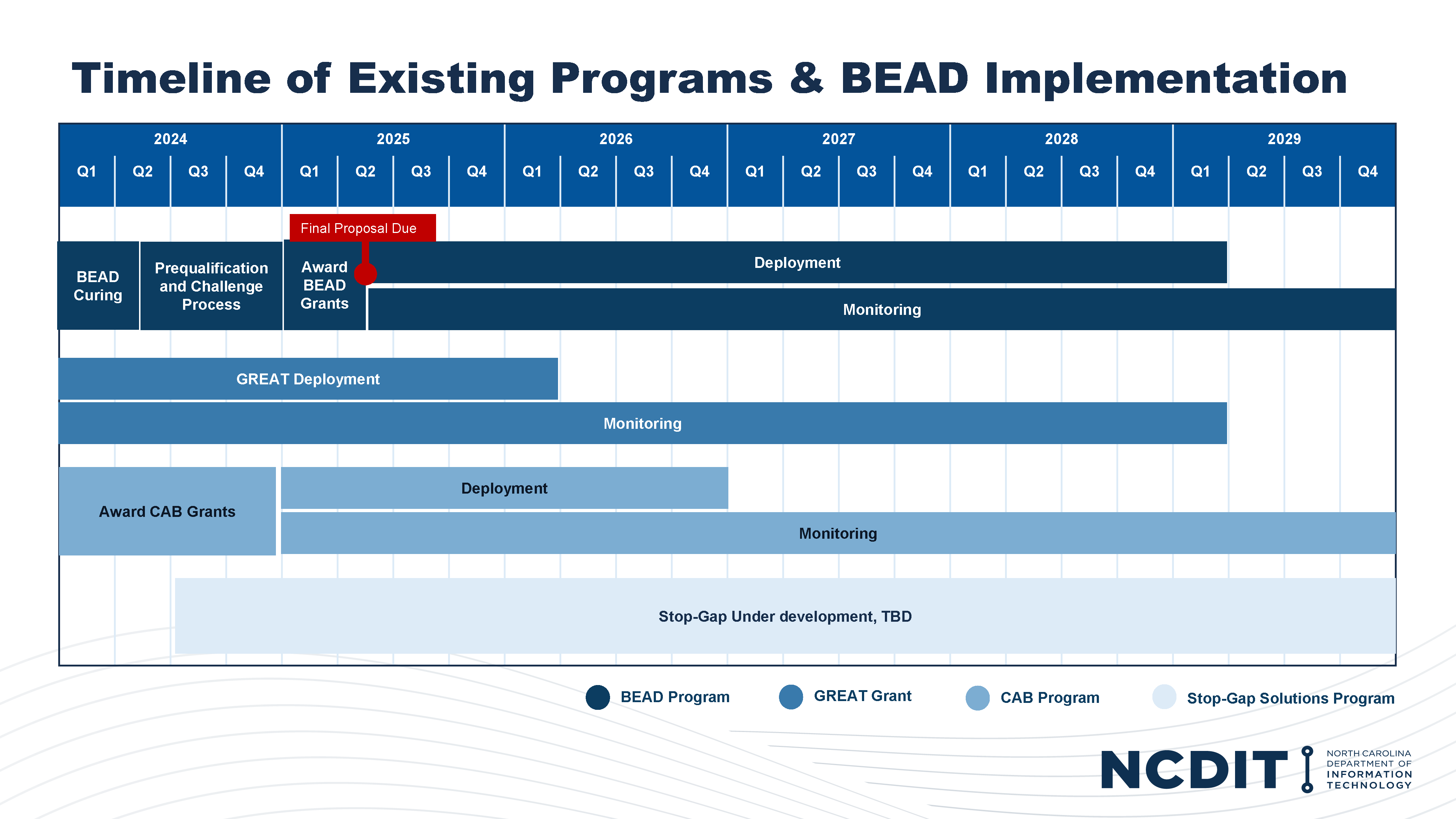Digital Inclusion Resource Hub
Digital Inclusion Planning Resources
Planning Guides
BAND-NC Digital Inclusion Planning Guide
NC DIT’s Digital Inclusion Template & Guide
NDIA Digital Inclusion Coalition Guidebook
Completed North Carolina Plans
North Carolina Digital Equity Plan – Released April 2024
Literature Review of NC Digital Inclusion Plans – Last updated August 2023
By Council of Government
- Albemarle Commission
- Cape Fear Council of Governments
- Centralina Regional Councils
- Central Pines Council of Governments
- Eastern Carolina Council of Governments
- High Country Council of Governments
- Isothermal Regional Commission
- Land-of-Sky Regional Council
- Lumber River Council of Governments
- Piedmont Triad Council of Governments
- Southwestern Commission
- Upper Coastal Plain Council of Governments
- Western Piedmont Council of Governments
Active Surveys
North Carolina Broadband Survey
View the survey. Designed to gather information on locations (households and businesses) in the state without adequate internet access and speeds.
- For Homes & Businesses with Internet Service: take the survey online
- For Homes & Businesses without Internet Service, take the survey by phone:
- Text “internet” to 919-750-0553
- OR call 919-750-0553
Asset Inventory Survey
For organizations, businesses, and groups, this survey collects information about all organizations offering services that help people get online across the state. Initially created to inform NC’s Digital Inclusion Plan and will remain open to continue to compile assets and add them to a database.
Data Sources
NC One Map
NC One Map: Includes maps on broadband funding and grants, broadband adoption and availability index, NC Broadband Survey, and more. All data is available to download.
NC Asset Inventory
NC Asset Inventory: Current list of organizations offering services that help people get online across the state. This spreadsheet will be turned into a searchable database in summer 2024.
County and Regional Digital Inclusion Profiles
County and Regional Digital Inclusion Profiles: These profiles were created by Roberto Gallardo, Ph.D. using 2017-2021 Census Five-Year American Community Survey data and Ookla speed test data as a measure of broadband availability. The profiles are formatted in PowerPoint by County or Council of Government region.
NC State’s Friday Institute of Educational Innovation Literature Review of Digital Literacy and Equity
This comprehensive analysis of digital literacy and equity resources, articles, and data sets provides an important overview for creating a digital inclusion plan.
Statewide Listening Session Policy Briefs
Statewide Listening Session Policy Briefs: Important listening sessions were conducted across the state in order to inform NC’s digital equity plan. Careful attention was paid to make sure the sessions were hosted in geographically diverse areas, with residents representing one or more of NC’s priority populations.
FCC National Broadband Map
FCC National Broadband Map: Search for Broadband availability by address or provider. Download broadband data and make challenges to the map.
BAND-NC Webinars and Workshops
Digital Inclusion Planning
Data Deep Dive: Accessing Data for Digital Inclusion Planning
Planning Digital Inclusion: Device Distribution & Digital Skills
Processing Digital Inclusion: Equity and Broadband Adoption
Presenting Digital Inclusion: Getting Your Community Started on a Digital Inclusion Plan
Broadband and Digital Inclusion Funding Programs
NC DIT Division of Broadband and Digital Opportunity: Digital Champion Grant
Digital Champion Grant (Awarded June 2024)
National Telecommunications and Information Administration (NTIA): Connecting Minority Communities Program (CMC) Grant
Connecting Minority Communities Program (CMC) Grant: Funds Historically Black Colleges and Universities (HBCUs), Tribal Colleges and Universities (TCUs), and Minority-Serving Institutions (MSIs) to purchase broadband internet access service and eligible equipment or to hire and train information technology personnel.
NC DIT: Growing Rural Economies with Access to Technology (GREAT) Grant
Growing Rural Economies with Access to Technology (GREAT) Grant: Funds the deployment of broadband within unserved areas of economically distressed counties.
NC DIT: Broadband Pole Replacement Program
Broadband Pole Replacement Program: Program to quickly facilitate the deployment of broadband service to households, businesses, agricultural operations and community anchor institutions in areas unserved with broadband.
Applications accepted on a rolling basis.
NC DIT: Completing Access to Broadband (CAB) Program
Completing Access to Broadband (CAB) Program: Provides an opportunity for individual NC counties to partner with NCDIT to fund broadband deployment projects in unserved areas of each county.
NC DIT: Stop-Gap Solutions
Stop-Gap Solutions: Program requirements are currently under development.
Timeline of NC DIT Broadband Funding

What’s Missing?
Contact Jess Epsten with resources to add:
